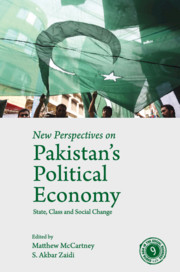Book contents
- Frontmatter
- Contents
- Preface
- Introduction
- 1 In a Desperate State: The Social Sciences and the Overdeveloped State in Pakistan, 1950 to 1983
- 2 The Overdeveloped Alavian Legacy
- 3 Institutions Matter: The State, the Military and Social Class
- 4 Class Is Dead but Faith Never Dies: Women, Islam and Pakistan
- 5 The Amnesia of Genesis
- 6 The Political Economy of Uneven State-Spatiality in Pakistan: The Interplay of Space, Class and Institutions
- 7 An Evolving Class Structure? Pakistan's Ruling Classes and the Implications for Pakistan's Political Economy
- 8 The Segmented ‘Rural Elite’: Agrarian Transformation and Rural Politics in Pakistani Punjab
- 9 Ascending the Power Structure: Bazaar Traders in Urban Punjab
- 10 Democracy and Patronage in Pakistan
- 11 From Overdeveloped State to Praetorian Pakistan: Tracing the Media's Transformations
- About the Contributors
- Index
1 - In a Desperate State: The Social Sciences and the Overdeveloped State in Pakistan, 1950 to 1983
Published online by Cambridge University Press: 26 April 2019
- Frontmatter
- Contents
- Preface
- Introduction
- 1 In a Desperate State: The Social Sciences and the Overdeveloped State in Pakistan, 1950 to 1983
- 2 The Overdeveloped Alavian Legacy
- 3 Institutions Matter: The State, the Military and Social Class
- 4 Class Is Dead but Faith Never Dies: Women, Islam and Pakistan
- 5 The Amnesia of Genesis
- 6 The Political Economy of Uneven State-Spatiality in Pakistan: The Interplay of Space, Class and Institutions
- 7 An Evolving Class Structure? Pakistan's Ruling Classes and the Implications for Pakistan's Political Economy
- 8 The Segmented ‘Rural Elite’: Agrarian Transformation and Rural Politics in Pakistani Punjab
- 9 Ascending the Power Structure: Bazaar Traders in Urban Punjab
- 10 Democracy and Patronage in Pakistan
- 11 From Overdeveloped State to Praetorian Pakistan: Tracing the Media's Transformations
- About the Contributors
- Index
Summary
INTRODUCTION
Hamza Alavi published ‘The State in Post-Colonial Societies: Pakistan and Bangladesh’ in 1972 with the aim of drawing general lessons for the classical Marxist theory of the state from a single case study – postcolonial Pakistan. He argued that Pakistan's colonial experience endowed it with a state that was ‘overdeveloped’ after independence relative to the developing economy and society of Pakistan. What Alavi called the ‘three propertied classes’ (the indigenous bourgeoisie, metropolitan bourgeoisie and large farmers) at independence had convergent, not competing, economic interests which allowed a bureaucratic-military-dominated state to mediate between them and so gave the state a relatively autonomous role. Two subsequent essays ‘Class and State’ and ‘Elite Farmer Strategy and Regional Disparities in Agricultural Development’ were published by Alavi in 1983 in an edited collection (Gardezi and Rashid 1983). These essays sought to explore in greater detail ‘the social character of the civil bureaucracy and military, class origins, class affiliations and class commitments of the dominant classes and the struggle of subordinate classes’.
While other chapters in this book look forward to thinking about the validity of Alavi and his overdeveloped state argument in the decades since publication, this chapter looks backwards. This chapter considers the validity of Alavi's model in the post-independence decades up to the early 1980s in light of the evidence which would have been available to Alavi himself. In doing so this chapter goes back to Alavi and looks in careful detail at the strengths and weaknesses of his model of the overdeveloped state and asks how valid the model was as a representation of the Pakistani state and society between the 1950s and early 1980s.
The next section looks in detail at the three propertied classes, followed by a section on state autonomy and the overdeveloped state, after which we turn to factors that were missing from Alavi's analysis, such as politicians and labour, and then concludes with an overall evaluation of Alavi's model of the overdeveloped state.
THREE PROPERTIED CLASSES
The colonial state was what Guha called ‘an autocracy set up and sustained by a democracy’ the consequences of which was the ‘historic failure of capital to realise its universalising tendency under colonial conditions’ (1997:12).
- Type
- Chapter
- Information
- New Perspectives on Pakistan's Political EconomyState, Class and Social Change, pp. 25 - 55Publisher: Cambridge University PressPrint publication year: 2019



